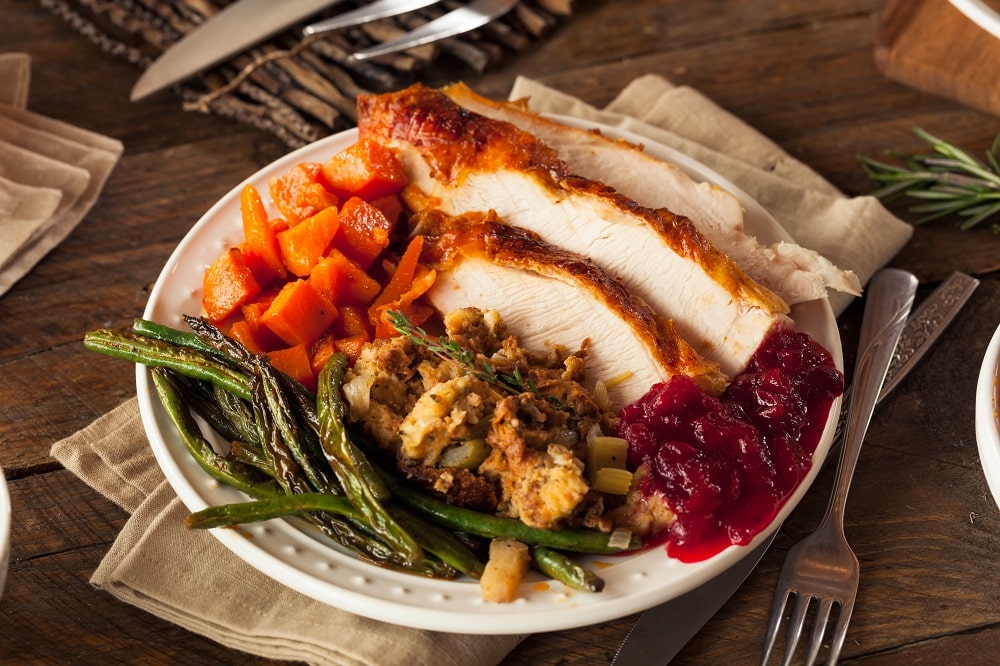
Holidays like Thanksgiving are a tempting time, often leading us to treat ourselves a little too much. In fact, studies show the average American consumes almost three times the recommended daily caloric intake on this day alone. That’s a major risk for weight gain and other subsequent health problems.
Ashley Delk, a registered dietitian from the University of Alabama at Birmingham, emphasizes that taking part in some delicious holiday cheer is fine–but moderation is key. “On average, people might find themselves a pound heavier post-holiday season,” she points out. And those seasonal pounds can add up over the years.
Here are Delk’s tips to avoid overeating during the holidays, ensuring we enjoy our favorite dishes without the side of regret.
5 Tips to avoid overeating during the holidays
Limit added sugars, saturated fats, and salt.
Holiday casseroles are a delectable favorite, but they’re typically some of the least healthy options at the table. “By limiting casseroles, you can limit the amount of added sugars, saturated fats, and salt you consume with one fell swoop,” Delk confirms.
With the daily sodium recommendation for adults sitting at 2,300 milligrams–an amount we easily reach with an ordinary, non-holiday diet–it’s wise to stick to a few bites of casserole or skip it altogether.
If you’re doing the cooking, you can also utilize alternative seasoning options. Delk suggests using cinnamon instead of some of the salt or sugar in dishes like sweet potato casseroles or pies. This substitution not only cuts out excess sodium or calories, but also enhances the dish’s natural flavors.
Furthermore, steering clear of ultra-processed foods like canned cranberry sauces and instant macaroni and cheese can help you reduce your calorie intake. These foods contain hidden sugars, fats, and sodium that promote weight gain, as well as other issues like inflammation.
Stick to a regular eating schedule.
On a typical Thanksgiving, Americans consume a whopping 4,500 calories. That’s equivalent to about 14 slices of pumpkin pie, according to research from the Calorie Control Council.
“We know that skipping meals before a big meal like Thanksgiving backfires,” Delk says. That’s because skipping meals triggers an increase in ghrelin, the body’s “hunger hormone,” while reducing leptin, the “satiety hormone.” This hormonal disruption makes it challenging to discern when you’re genuinely full, which can set the stage for inadvertent overeating or even binge sessions.
“Sticking to a solid meal schedule (breakfast, lunch and dinner) will help you to not overindulge,” Delk suggests. If there’s a big gap between lunch and holiday meal-time, keep nutritious snacks on hand so you’re not too hungry by the time dinner rolls around.
Prioritize balance (and veggies) on your plate.
Practicing portion control during holidays can be a challenge, when overindulgence is almost encouraged.
To combat this, Delk recommends starting by dividing your plate into fourths. From there, fill up half the plate with fruits and veggies–think green beans, cranberries (unless loaded with sugar), squash, or carrots.
Dedicate one quarter of the plate to lean proteins like white turkey meat. And save the remaining quarter for one carbohydrate, such as a dinner roll, mashed potatoes, or whole-grain rice.
“Increasing fruits and vegetables on your plate fills you up and reduces the number of calories you might normally take in,” she says. You can also serve yourself what you’d consider to be half a serving of different foods. This will help keep you from overeating while enjoying variety, and not missing out on your favorite dishes.
Limit or modify drinks.
Delk also recommends watching your drink intake. Festive beverages like apple cider, hot chocolate, and sugary coffee concoctions are often loaded with sugar and can max out your calorie count.
“A lot of times, we forget that drinks have calories,” she says. “It’s a good idea to think of those things almost as desserts.” Some great ways to rein in liquid calories are:
- Limiting yourself to one serving
- Making your holiday drinks with a zero-calorie sweetener like stevia
- Adding fresh fruit to water as a calorie-free alternative
And if you plan to enjoy an alcoholic beverage, skip the high-calorie options like eggnog and instead enjoy a glass or two of wine, beer, or liquor mixed with club soda. That way, you can take part in the celebration without overloading your tank.
Stay active
“Maintaining a normal exercise pattern during the holidays is crucial,” Delk adds.
Not only does physical activity burn more calories than you would while lounging, but studies show that cardiovascular exercises like running, cycling, and swimming can also curb your appetite. This effect is attributed to the generation of heat in the body, which influences hunger-related hormones.
So don’t skip your workouts, and consider taking a walk immediately after holiday meals, as well. Walking after dining supports healthy digestion by stimulating the gastrointestinal system, ensuring that food moves smoothly and quickly through the digestive tract. Plus, you’ll burn off a few more of those just-consumed calories.
As the festivities start, it’s easy to get swept up in the merry mood and give into culinary temptations. Keep these tips in mind to avoid overeating during the holidays and you’ll not only enjoy the season with less stress and regret, but you’ll pave a healthier path into the new year.
References:
http://caloriecontrol.org/wp-content/uploads/Typical-Thanksgiving-Calorie-Meal.jpg
https://pubmed.ncbi.nlm.nih.gov/10727591/
https://pubmed.ncbi.nlm.nih.gov/32398192/
https://www.ncbi.nlm.nih.gov/pmc/articles/PMC4336296/
https://www.ncbi.nlm.nih.gov/pmc/articles/PMC7832851/
https://www.frontiersin.org/articles/10.3389/fendo.2021.585887/full
https://www.ncbi.nlm.nih.gov/pmc/articles/PMC4644575/
https://www.ncbi.nlm.nih.gov/pmc/articles/PMC4086735/
https://www.ncbi.nlm.nih.gov/pmc/articles/PMC4025698/
https://www.cdc.gov/nchs/products/databriefs/db110.htm
https://www.ncbi.nlm.nih.gov/pmc/articles/PMC2952805/
https://www.ncbi.nlm.nih.gov/pmc/articles/PMC5037567/
https://www.ncbi.nlm.nih.gov/pmc/articles/PMC3119587/
https://www.ncbi.nlm.nih.gov/pmc/articles/PMC3144158/
https://journals.plos.org/plosbiology/article?id=10.1371/journal.pbio.2006188
https://www.ncbi.nlm.nih.gov/pmc/articles/PMC7259724/
https://pubmed.ncbi.nlm.nih.gov/22089363/
https://pubmed.ncbi.nlm.nih.gov/22089363/
https://www.ncbi.nlm.nih.gov/pmc/articles/PMC3925973/
https://www.ncbi.nlm.nih.gov/pmc/articles/PMC7019516/
https://www.ncbi.nlm.nih.gov/pmc/articles/PMC7246833/
Related
Credit : Source Post






